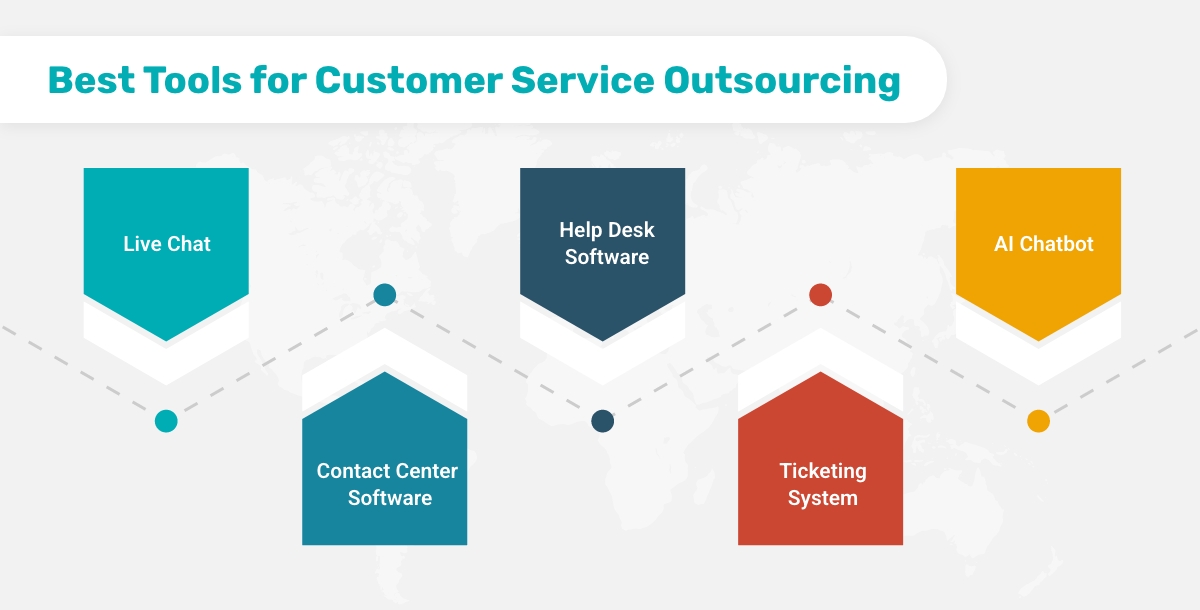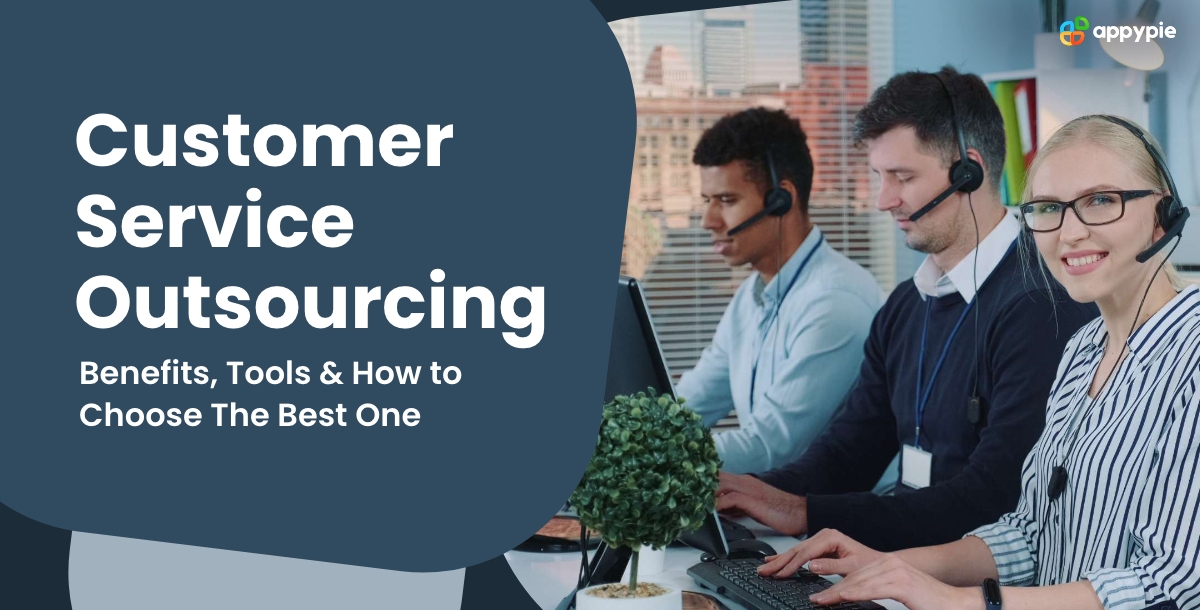Customer Service Outsourcing: Benefits, Tools & How to Choose The Best One

Welcome to our insightful blog, where we'll explore customer service outsourcing. Whether you're a budding entrepreneur or an established business leader, this guide will help you navigate the concept of customer service outsourcing, its benefits, key considerations, and the best tools to optimize the process. Let's dig in and learn the potential of exceptional customer service together!
What is Customer Service?
Customer service is the practice of assisting and supporting customers before, during, and after they purchase a product or service. This can include e-customer service, such as email and live chat support, as well as automated customer service, like chatbots. Effective customer service improves the customer experience, leading to increased satisfaction, loyalty, and repeat business. Now you know what is customer service? Let's move forward to learn about customer service outsourcing.
What is Customer Service Outsourcing?
Customer Service Outsourcing (CSO) refers to the practice of hiring third-party service providers, known as customer service outsourcing companies, to handle an organization's customer support functions. These functions typically include call center operations, email and chat support, social media engagement, and other forms of customer communication. By outsourcing customer service, businesses can benefit from cost savings, access to specialized expertise, increased efficiency, and improved customer satisfaction. Some well-known customer service outsourcing companies include Teleperformance, Convergys, and Alorica.
Benefits of Outsourcing Customer Service

Outsourcing customer service offers numerous benefits to businesses. Here are five key advantages:
- Cost Efficiency: Outsourcing can reduce labor and operational costs associated with in-house customer service teams, including recruitment, training, and infrastructure expenses.
- Focus on Core Business: By outsourcing customer service, businesses can redirect their resources and attention toward their core competencies and strategic objectives. This allows them to focus on what they do best, which will lead to increased productivity and growth.
- 24/7 Support: Outsourcing customer service enables businesses to provide round-the-clock support to their customers. With agents located in different time zones, businesses can ensure that their customers receive assistance at any time, improving customer satisfaction.
- Expertise and Skill Set: Customer service outsourcing companies employ highly trained and experienced agents who specialize in handling customer inquiries and complaints. These professionals stay updated with industry trends, products, and services, ensuring that businesses receive top-notch customer support.
Best Tools for Customer Service Outsourcing

To improve the efficiency and effectiveness of customer service outsourcing, businesses can leverage a range of powerful tools. Here are some of the best tools to consider:
- Live Chat: Live chat is a cost-effective tool for businesses to provide 24/7 customer support. It offers instant help, multilingual agents, and an improved customer experience. Chat transcripts provide valuable data, and proactive engagement reduces abandonment rates, benefiting e-commerce sites. Choose a reliable provider for smooth integration and quality service.
- Contact Center Software: Contact center software is a comprehensive solution for managing multiple communication channels, including voice, email, chat, and social media. It provides features like call routing, recording, analytics, and workforce management, ensuring seamless interactions and enhancing overall customer experience.
- Help Desk Software: Help desk software smooths customer support by providing a centralized platform to manage and monitor customer queries. It efficiently categorizes inquiries into tickets, enabling support agents to prioritize and resolve issues instantly. With features like ticket tracking, collaboration tools, and knowledge bases, this software optimizes workflows, improves agent productivity, and fosters better customer experiences through timely and effective assistance.
- Ticketing System: A Ticketing system is an essential tool for organizations to efficiently organize and respond to customer queries or issues. It creates a structured workflow by assigning unique tickets to each query, allowing support teams to track progress, prioritize tasks, and ensure timely resolution. This system helps maintain a centralized database of interactions, enabling better communication, improved customer service, and improved overall customer satisfaction.
- AI Chatbot: AI Chatbot use natural language processing and machine learning to understand and respond to customer inquiries, providing personalized and accurate assistance 24/7. Chatbot builders enable businesses to create AI-powered chatbots that can handle routine customer queries, freeing up human agents to focus on more complex issues.
Key Considerations for Choosing Customer Support Outsourcing Services

Here are a few key considerations for choosing customer support outsourcing services:
- Remote or physical call center:
- Connectivity: Ensure the remote team has reliable internet and communication infrastructure to provide smooth support.
- Time Zone: Remote support can offer 24/7 coverage, while physical centers may be limited to local hours.
- Culture Fit: Assess if the remote setup aligns with your company culture and customer expectations.
- Service Level Agreements (SLAs):
- Availability and Coverage: Define desired service availability and coverage hours.
- Service Reporting and Monitoring: Specify reporting, monitoring, and escalation procedures.
- Consequences and Remedies: Outline consequences for not meeting SLAs and remedies for service failures.
- International vs. Domestic Outsourcing:
- Cost: Evaluate the budget and find the right balance between cost savings and service quality.
- Language Proficiency: Ensure the outsourced team can communicate effectively in your target language.
- Cultural Compatibility: Select a location with a similar business environment and customer service culture.
- Choosing the Right Location:
- Time Zone Compatibility: Opt for a location with overlapping working hours to ensure timely response.
- Infrastructure: The chosen location should have a robust IT infrastructure to support smooth operations.
- Labor Costs and Talent Pool: Look for regions with a skilled workforce and competitive labor costs.
- Legal and Regulatory Compliance: Ensure the outsourcing destination follows data privacy and security regulations.
- Dedicated or Shared Agents:
- Service Personalization: Dedicated agents can provide more personalized service, while shared agents might be more cost-effective.
- Volume of Inquiries: High volume might require dedicated resources, while lower volume could be managed by shared agents.
- Performance Metrics: Determine the success rates and customer satisfaction of both models to make an informed decision.
Remote customer support services have gained popularity due to cost savings, flexibility, and the ability to work from anywhere. Consider the following factors when choosing between remote or physical call centers:
When choosing an outsourcing service for customer support, it's crucial to establish clear Service Level Agreements (SLAs) that outline the expected performance standards and service delivery commitments. Consider the following factors when defining SLAs:
Both options have their pros and cons. International outsourcing often means lower costs but may introduce language and cultural barriers. Domestic outsourcing offers better cultural alignment but can be more expensive. Consider:
When selecting an outsourcing destination, it's crucial to align your choice with your business requirements. For instance, if you require customer service representatives proficient in European languages, Eastern European countries might be the best choice. If English and Spanish fluency are needed, you might consider Mexico or the Philippines. For English-speaking customer support, the Philippines is particularly renowned due to its large pool of college-educated call center experts who speak English nearly accent-free. Furthermore, the Philippines offers the advantage of operating across various time zones, making it an ideal choice for establishing a round-the-clock support service. When selecting a location for outsourcing, consider the following factors:
Dedicated agents work exclusively for your business, offering tailored support and fostering a deeper understanding of your brand. Shared agents, on the other hand, work for multiple clients and may have broader knowledge but less familiarity with your specific needs. Consider:
Outsourcing support vs. In-house support

Deciding between outsourcing support and in-house support depends on various factors such as the nature of your business, budget, expertise required, and the level of control you want over the support process. Here are some considerations for each option:
Outsourcing Support:
- Cost Efficiency: Outsourcing often leads to cost savings by eliminating the need to invest in infrastructure, salaries, and benefits for in-house staff.
- Global Reach: Access to a diverse talent pool enables the provision of multi-lingual support, expanding your customer base.
- Scalability: Service providers can easily adapt to changing business needs, allowing for quick expansion or contraction of resources.
- Specialized Expertise: Outsourcing partners usually have domain-specific knowledge and experience, providing professional customer service.
- Risk Management: Providers often have better disaster recovery plans, ensuring minimal disruption to their operations.
- Focus on Core Business: Outsourcing enables your company to concentrate on strategic initiatives, driving innovation and growth.
In-House Support:
- Control and Customization: Direct supervision allows for precise control over the customer experience, aligning with your brand values.
- Stronger Company Culture: In-house teams better understand the company culture, fostering a cohesive and responsive service.
- Quick Response: Direct internal communication can result in faster issue resolution, as there's no need for external coordination.
- Data Security: In-house control over sensitive data can offer increased security, as you manage your protocols.
- Employee Loyalty: Long-term relationships with in-house staff can lead to better customer retention and higher job satisfaction.
- Continuous Improvement: In-house teams can be more easily trained and developed, ensuring ongoing service improvement.
Conclusion
Customer service outsourcing offers a flexible and cost-effective solution to improve customer satisfaction, boost productivity, and achieve sustainable growth. By partnering with the right outsourcing provider, businesses can access a skilled workforce, achieve 24/7 support, and focus on their core competencies. Remember, successful outsourcing requires careful consideration of key factors like service level agreements, location selection, and the type of agent model needed. By carefully navigating through the process, businesses can get the true potential of exceptional customer service outsourcing.
Related Articles
- Best Landing Page Builder Software in 2023
- DocuSign vs. HelloSign: Which Should You Use in 2024?
- 7 Ways Artificial Intelligence Can Improve Help Desk Management
- How to Convert Images from JPG to JPEG Format?
- Top 10 Wallpaper Maker Tools in 2024
- Top 5 Spotify Integrations For Amusing Listening Experience
- Top 8 Most Expensive NFTs Ever Sold [Updated 2022]
- How to Compile Research and Build a Bibliography in Google Docs Using Google Keep
- Shopify vs. Etsy – Which One Should You Use?
- 12 Best Ways to Stop Your Designs from Looking the Same
